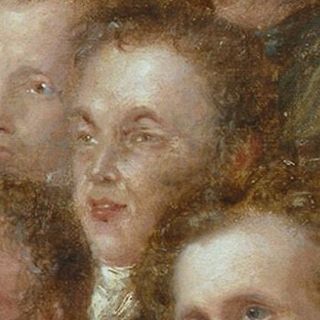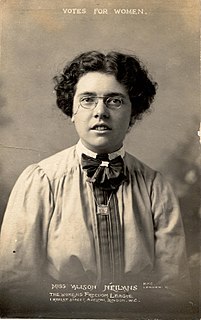A Quote by Vera Brittain
For a woman as for a man, marriage might enormously help or devastatingly hinder the growth of her power to contribute something impersonally valuable to the community in which she lived, but it was not that power, and could not be regarded as an end in itself. Nor, even, were children ends in themselves; it was useless to go on producing human beings merely in order that they, in their sequence, might produce others, and never turn from this business of continuous procreation to the accomplishment of some definite and lasting piece of work.
Quote Topics
Accomplishment
Beings
Business
Children
Community
Continuous
Contribute
Could
Definite
End
Ends
Even
Go
Growth
Help
Her
Hinder
Human
Human Being
Human Beings
Itself
Lasting
Lived
Man
Marriage
Merely
Might
Never
Nor
Order
Others
Piece
Power
Procreation
Produce
Producing
Regarded
Sequence
She
Some
Something
Themselves
Turn
Useless
Valuable
Were
Which
Woman
Work
Related Quotes
Another discovery which came out of my investigation was the fact that when one gives his or her order to produce a definite result and stands by that order, it seems to have the effect of giving one what might be termed a second sight which enables him or her to see right through ordinary problems. What this power is I cannot say; all I know is that it exists and it becomes available only when one is in that state of mind in which he or she knows exactly what one wants and is fully determined not to quit until he or she finds it.
Every woman whether rich or poor, married or single, has a circle of influence within which, according to her character, she is exerting a certain amount of power for good or harm. Every woman, by her virtue or her vice, by her folly or her wisdom, by her levity or her dignity, is adding something to our national elevation or degradation. A community is not likely to be overthrown where woman fulfills her mission, for by the power of her noble heart over the hearts of others, she will raise that community from its ruins and restore it again to prosperity and joy.
For loving, working, and creative people to throw off the yoke of power it is necessary to abolish power itself, not merely to make the yoke comfortable. Where some have power, others do not, and the two classes persist. A free society is where all have power-power over and responsibility for their own lives, power and reason to respect the lives of others. This is also a society without classes, a society of human beings, not rulers and the ruled.
One of my aunties inspires me beause of how easily she shows her emotions, and she isn't ever afraid to cry. My mum, for her work ethic - she might not show her emotions in public very much, but she's a total power woman. My grandma, who watched four of her children die before her, she's a powerhouse.
What is a woman's power then?" she asked. "I don't think we know." "When has a woman power because she's a woman? With her children, I suppose. For a while..." "In her house, maybe." She looked around the kitchen. "But the doors are shut," she said, "the doors are locked." "Because you're valuable." "Oh yes. We're precious. So long as we're powerless.
As ugly an admission as this is, I met my wife at a party, and if I had been to the same party and she were dressed in different clothes, I might never have talked to her. She might have projected something that I found distasteful, even if she otherwise looked exactly the same - a beautiful woman to me.
I hope through The L Word to become an honorary member of the gay tribe. I cherish the thought that some young girl or woman somewhere may one night turn on the television and for the first time ever see her life represented - not as an isolated incident but as a multiplicity. Her overwhelming fear may have been that she might never find her tribe, she might never find love and now she knows that they are both out there waiting for her.
... business training in early life should not be regarded solely as insurance against destitution in the case of an emergency. For from business experience women can gain, too, knowledge of the world and of human beings, which should be of immeasurable value to their marriage careers. Self-discipline, co-operation, adaptability, efficiency, economic management,--if she learns these in her business life she is liable for many less heartbreaks and disappointments in her married life.
The contempt which men feel for the prostitute, and the fact that they have always regarded themselves as far superior to her, even when they made use of her, suggests an attempt to rationalize the situation; it might be explained as an unconscious transference to the woman of the shame they feel for themselves in these relations.
Glamour, that trans-human aura or power to attract imitation, is a kind of vessel into which dreams are poured, and some vessels are simply worthier than others... A beautiful woman can turn heads but real glamour has a deeper pull... Glamour is the power to rearrange people's emotions, which, in effect, is the power to control one's environment.
If women had power, what would men be but women who can't bear children? And what would women be but men who can?" "Hah!" went Tenar; and presently, with some cunning, she said, "Haven't there been queens? Weren't they women of power?" "A queen's only a she-king," said Ged. She snorted. "I mean, men give her power. They let her use their power. But it isn't hers, is it? It isn't because she's a woman that she's powerful, but despite it.
All this care for the world, we must believe, is taken by the Gods without any act of will or labor. As bodies which possess some power produce their effects by merely existing: e.g. the sun gives light and heat by merely existing; so, and far more so, the providence of the Gods acts without effort to itself and for the good of the objects of its forethought. This solves the problems of the Epicureans , who argue that what is divine neither has trouble itself nor gives trouble to others.
We are not to suppose, that there is any violent exertion of power, such as is required in order to produce a great event in little time; in nature, we find no deficiency in respect of time, nor any limitation with regard to power. But time is not made to flow in vain; nor does there ever appear the exertion of superfluous power, or the manifestation of design, not calculated in wisdom to effect some general end.





































